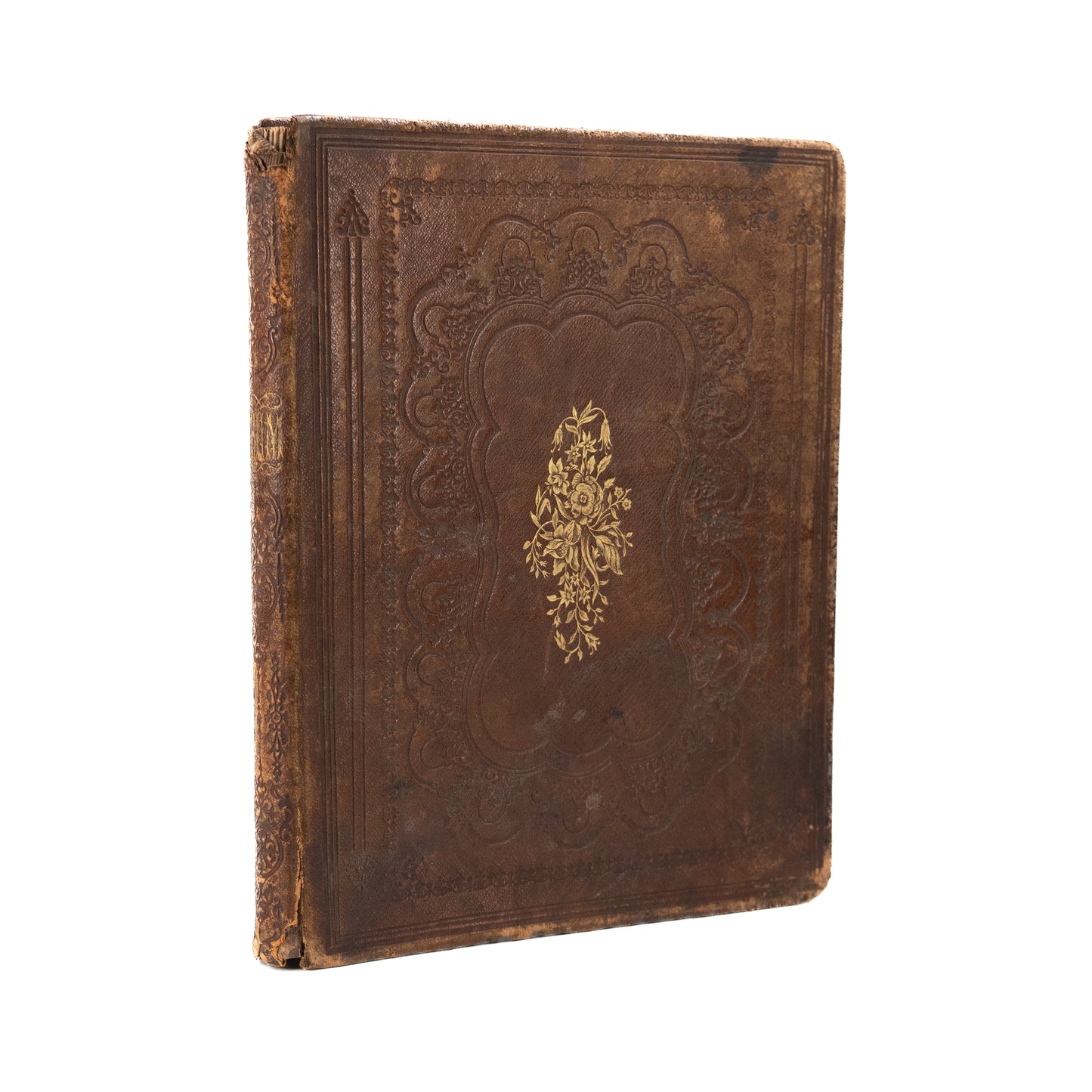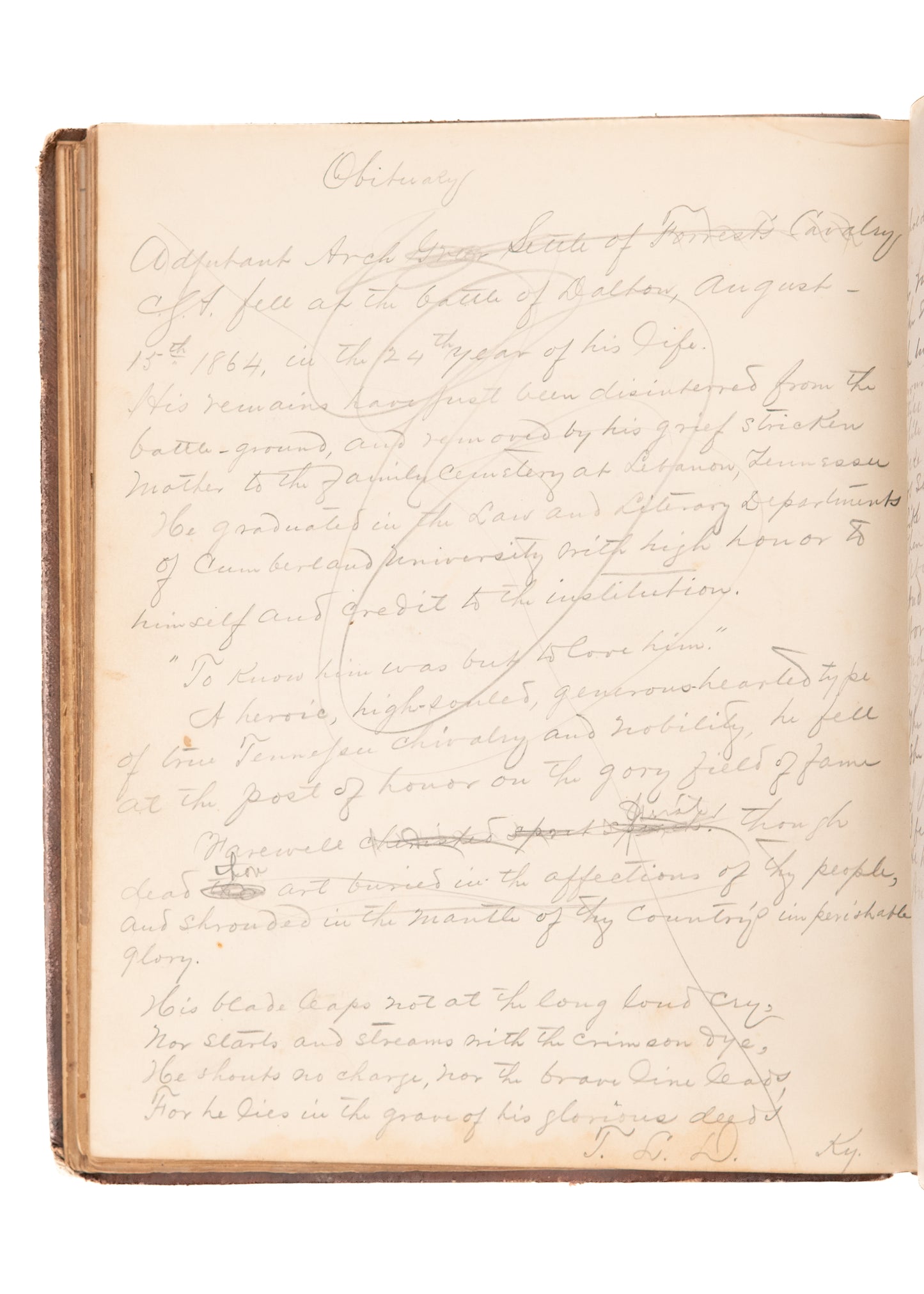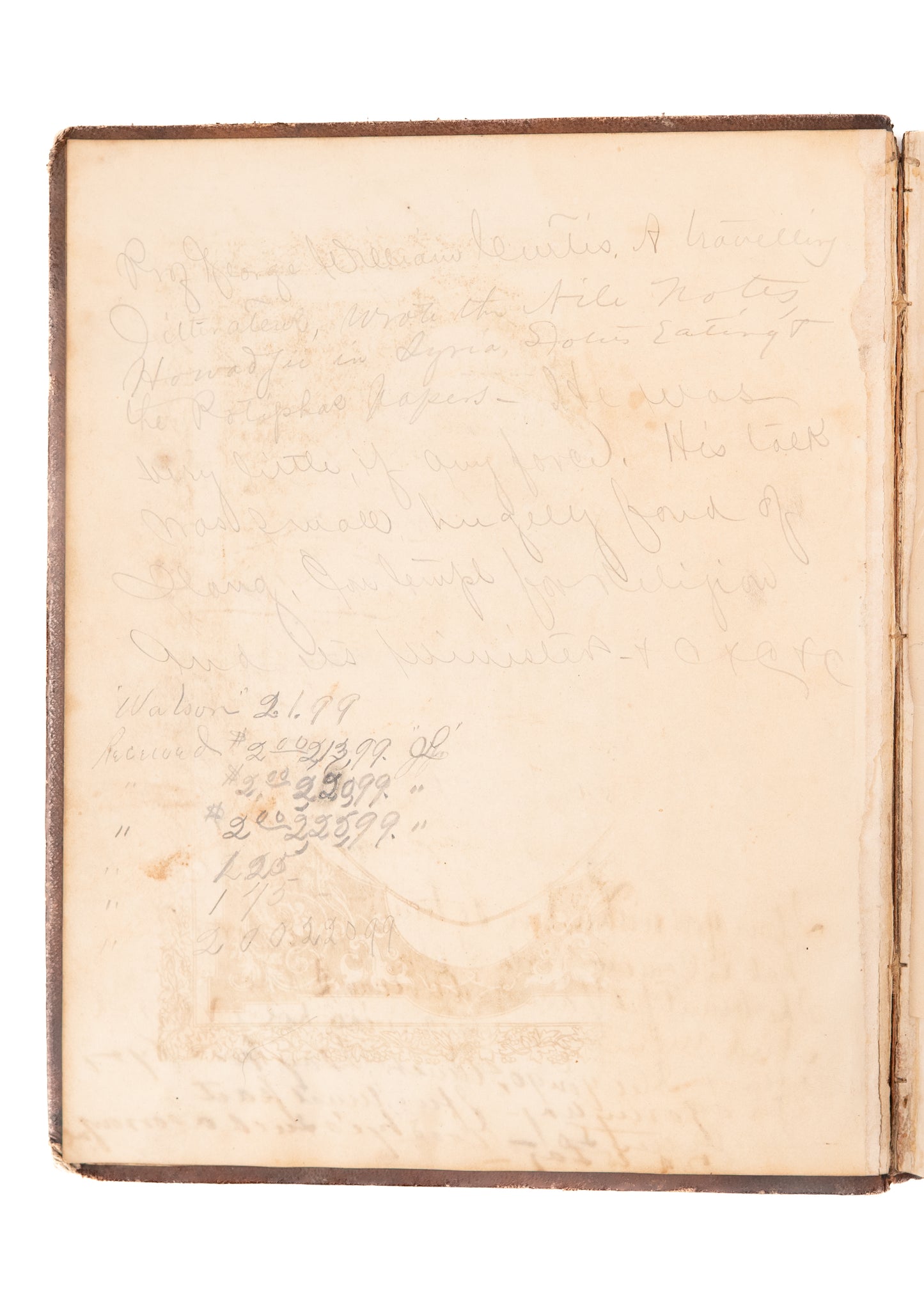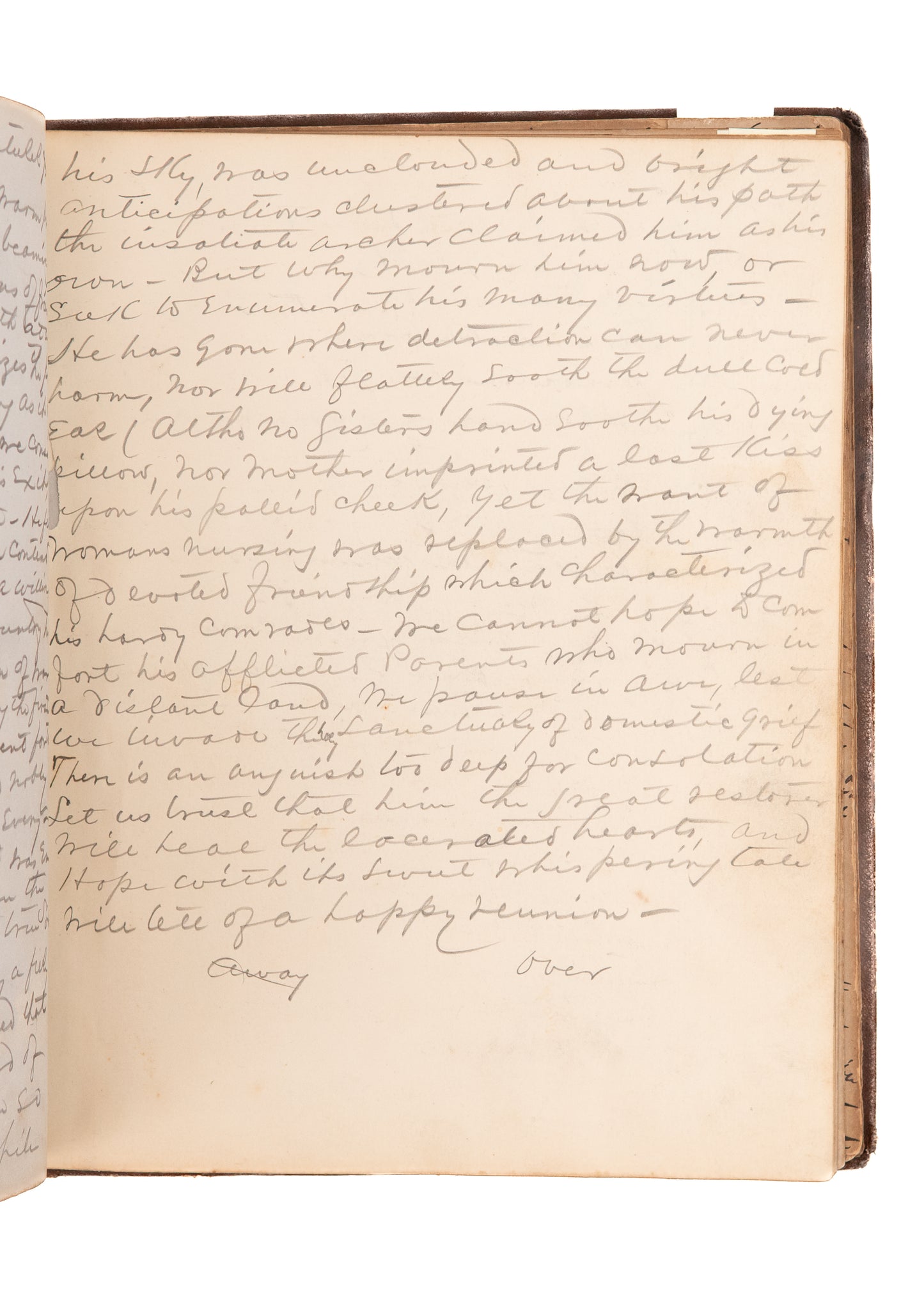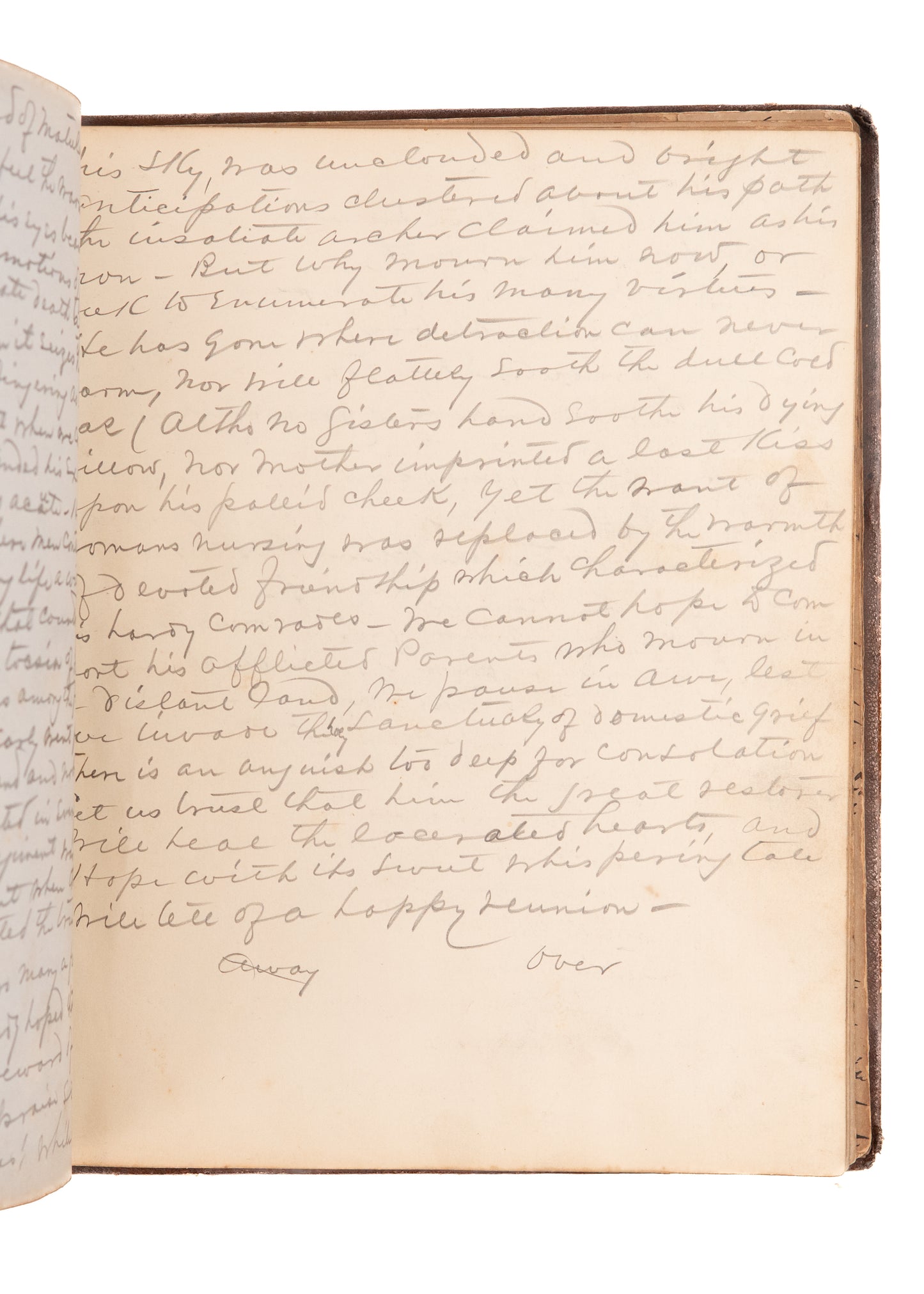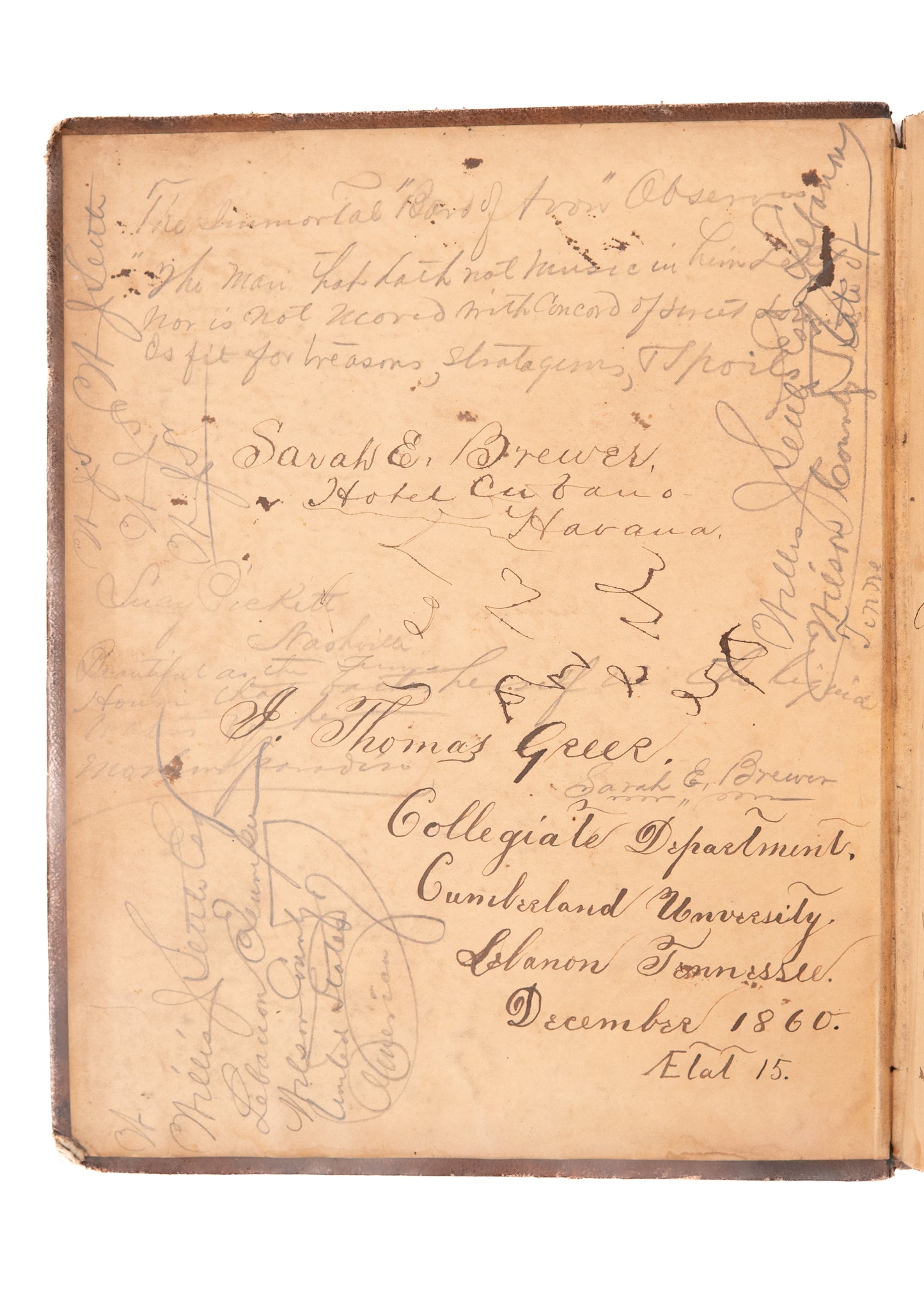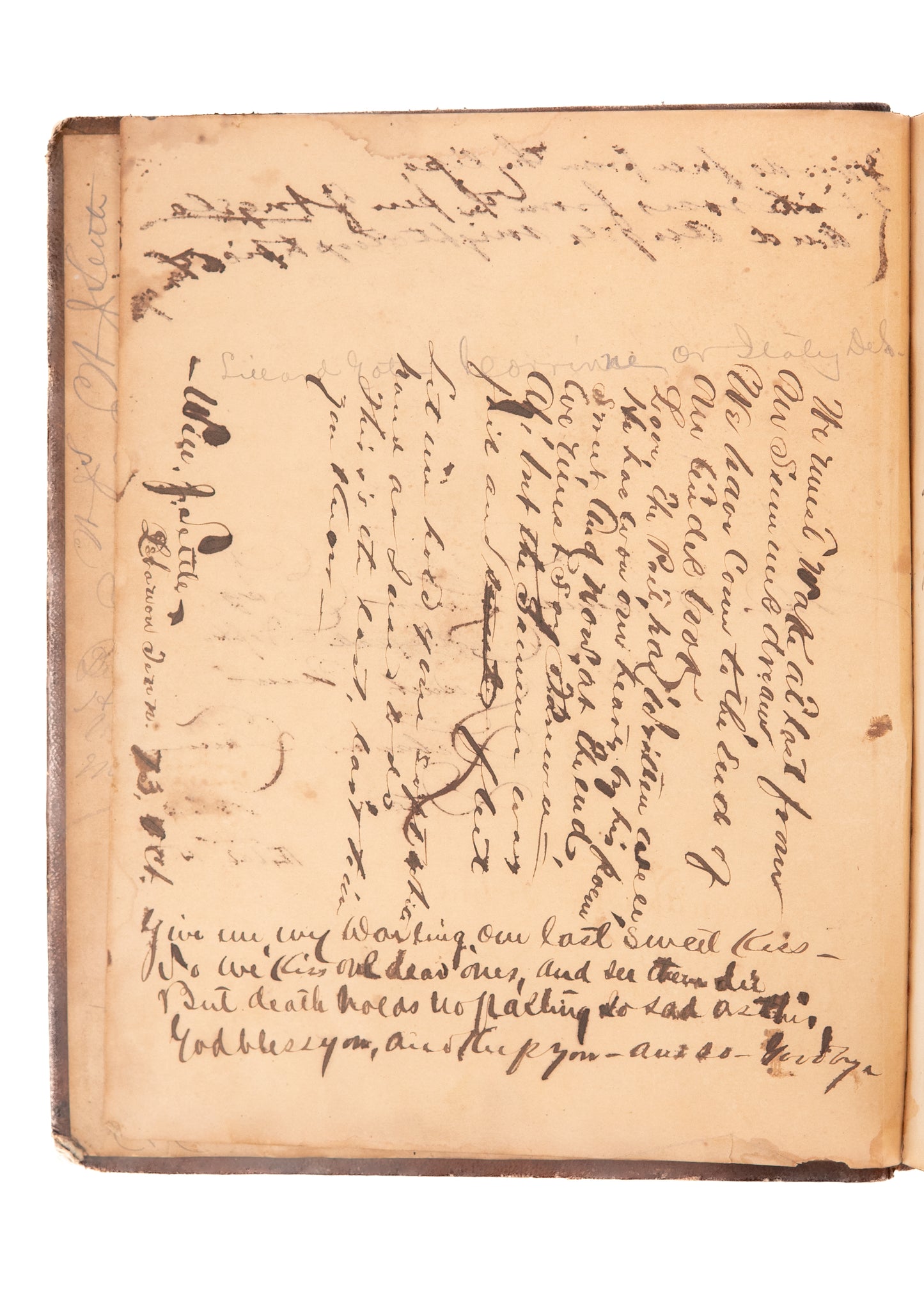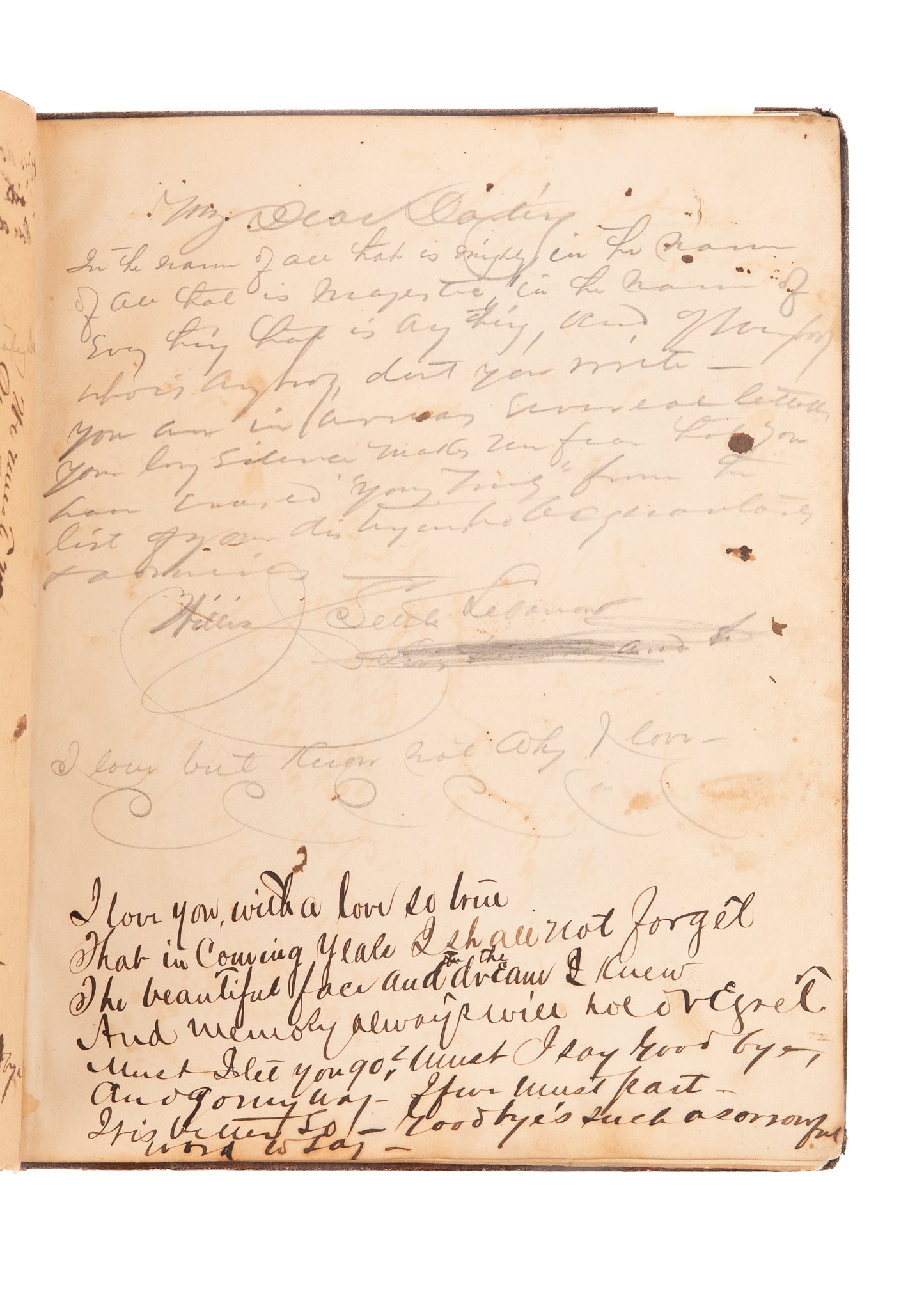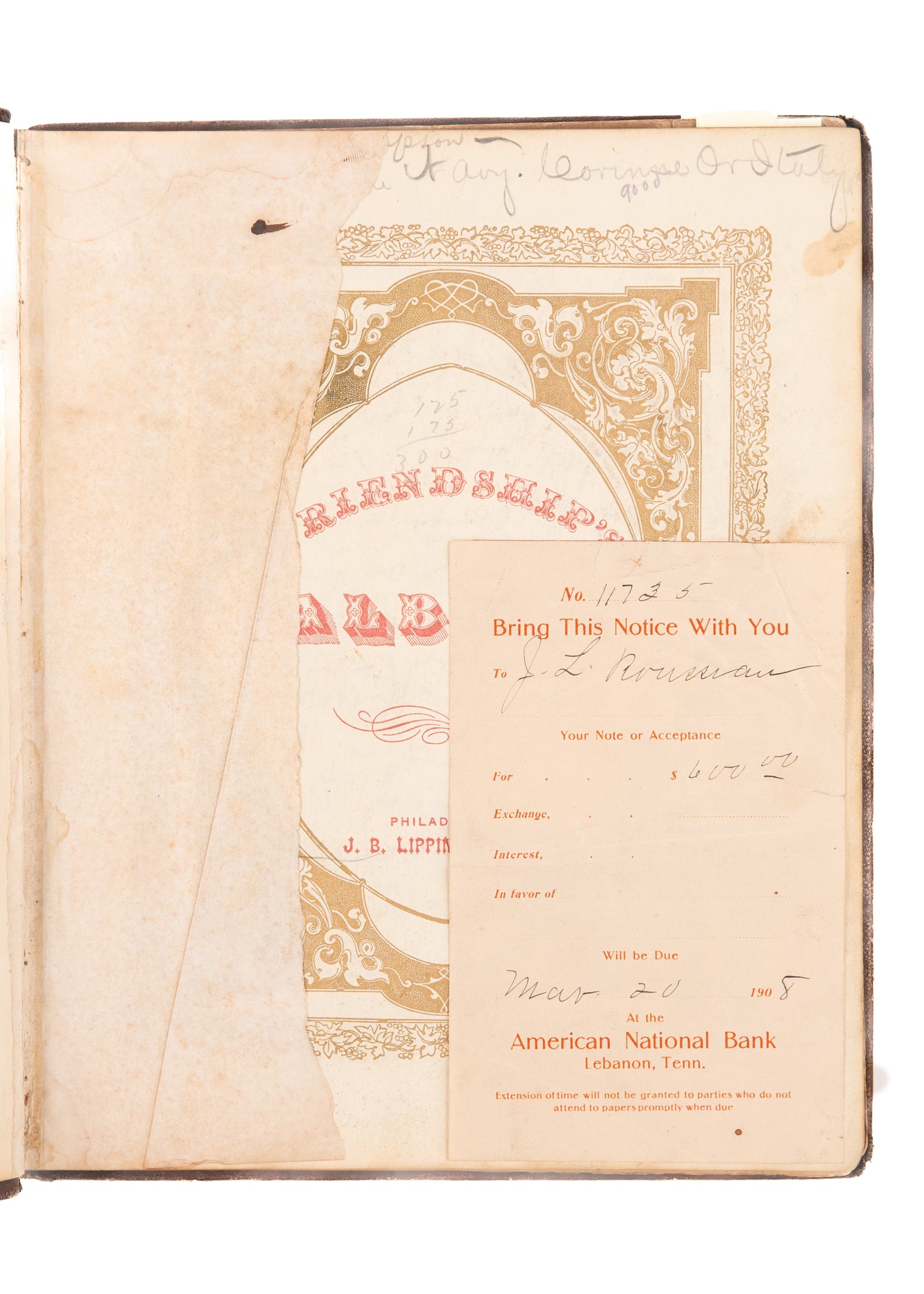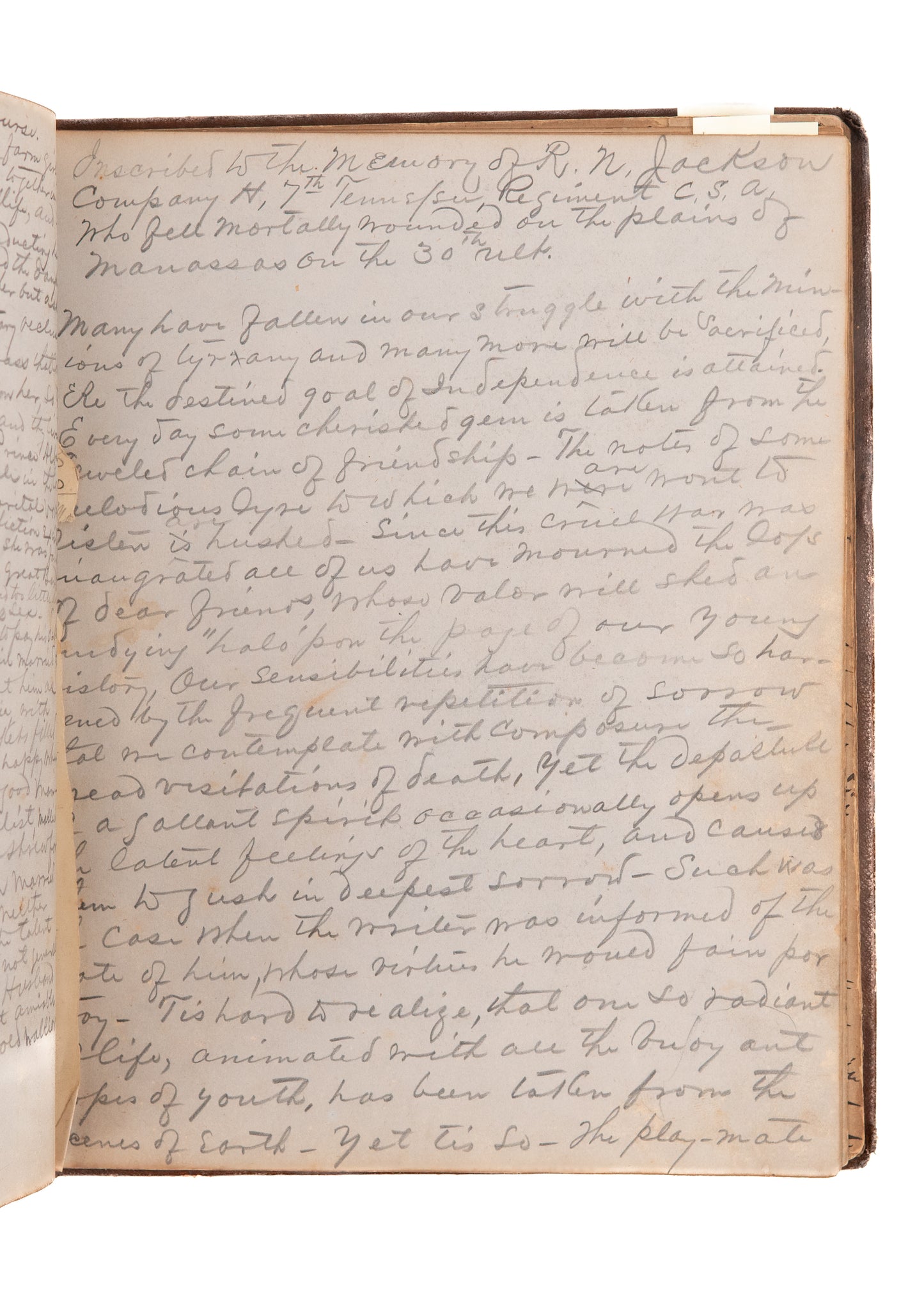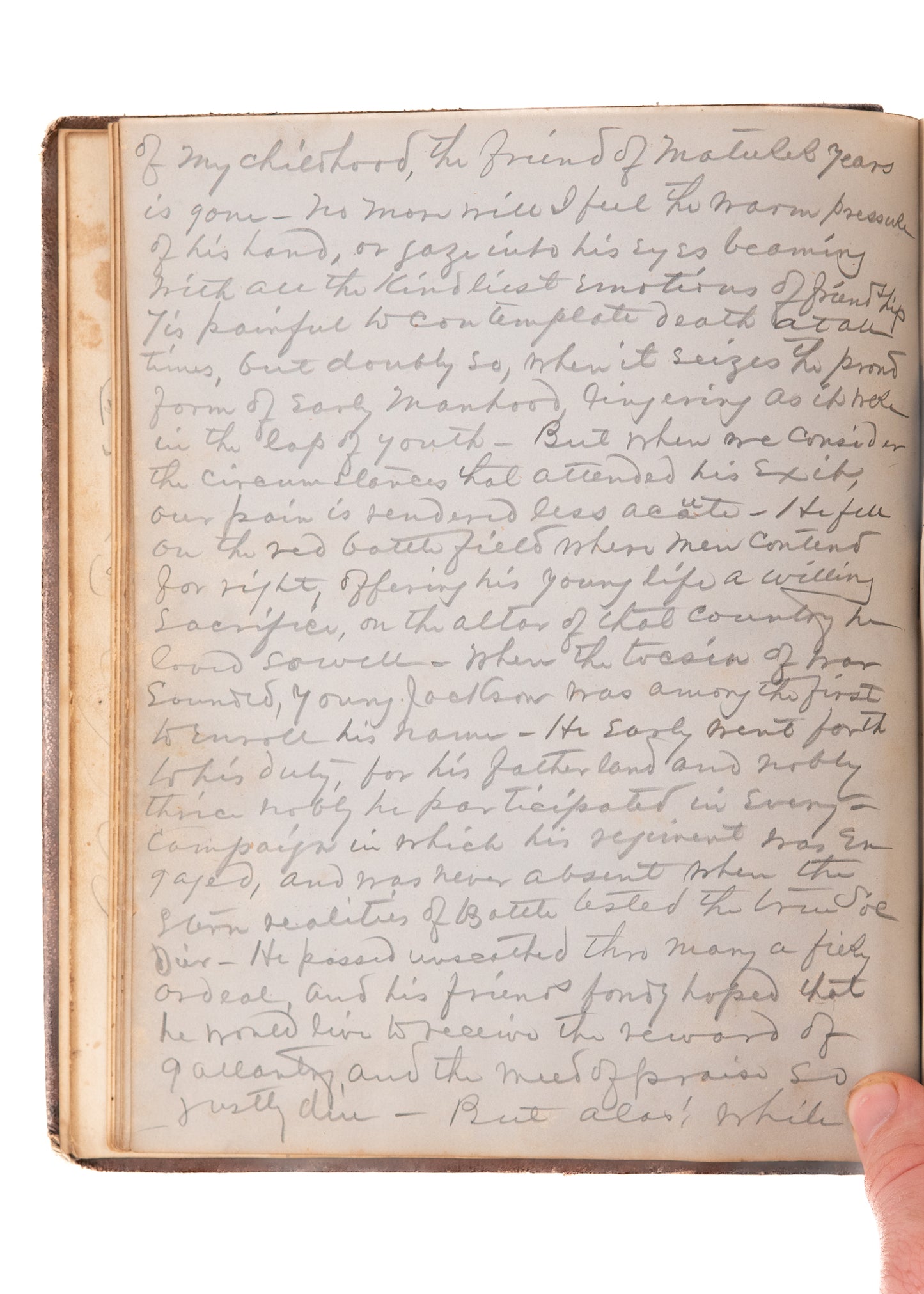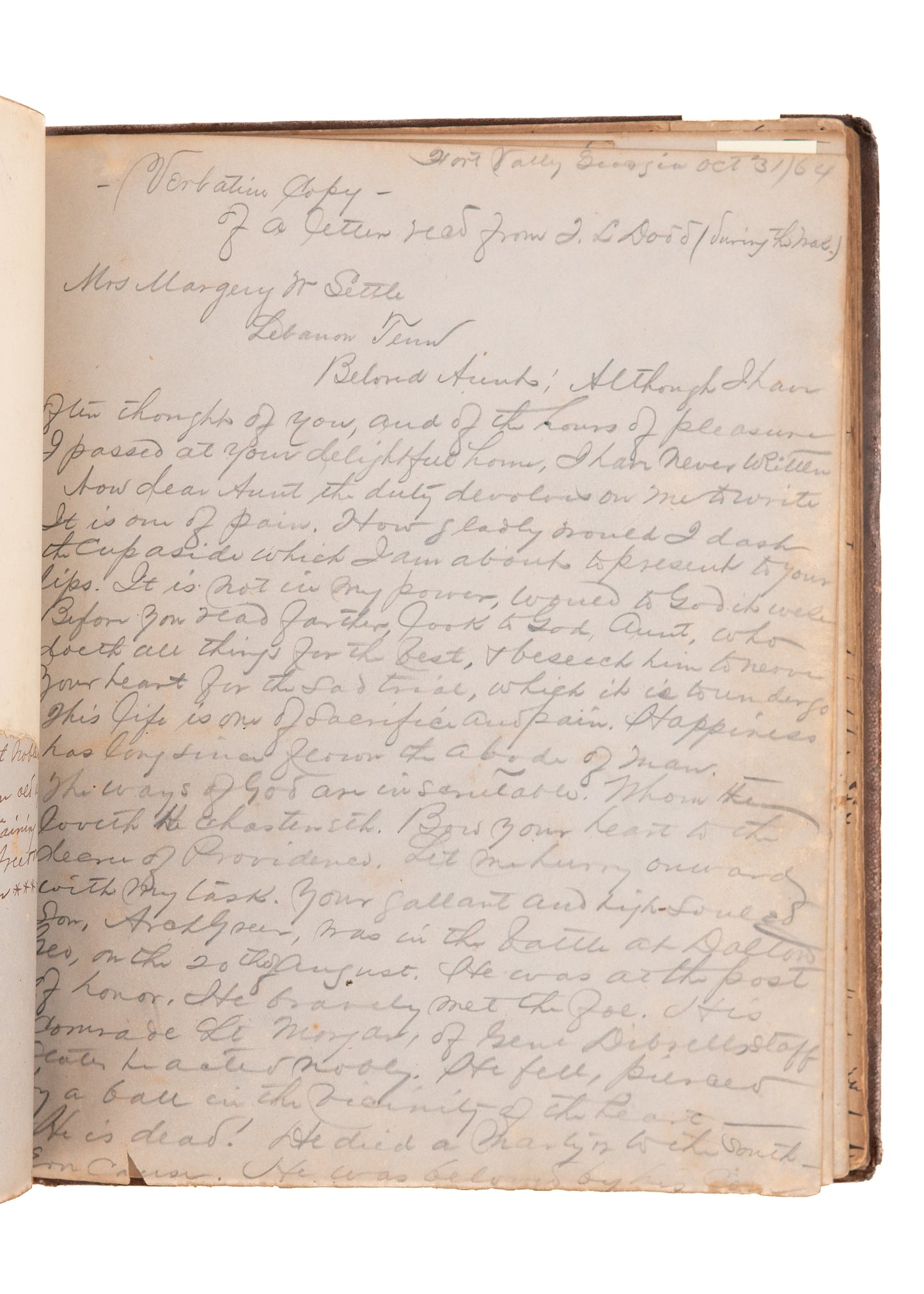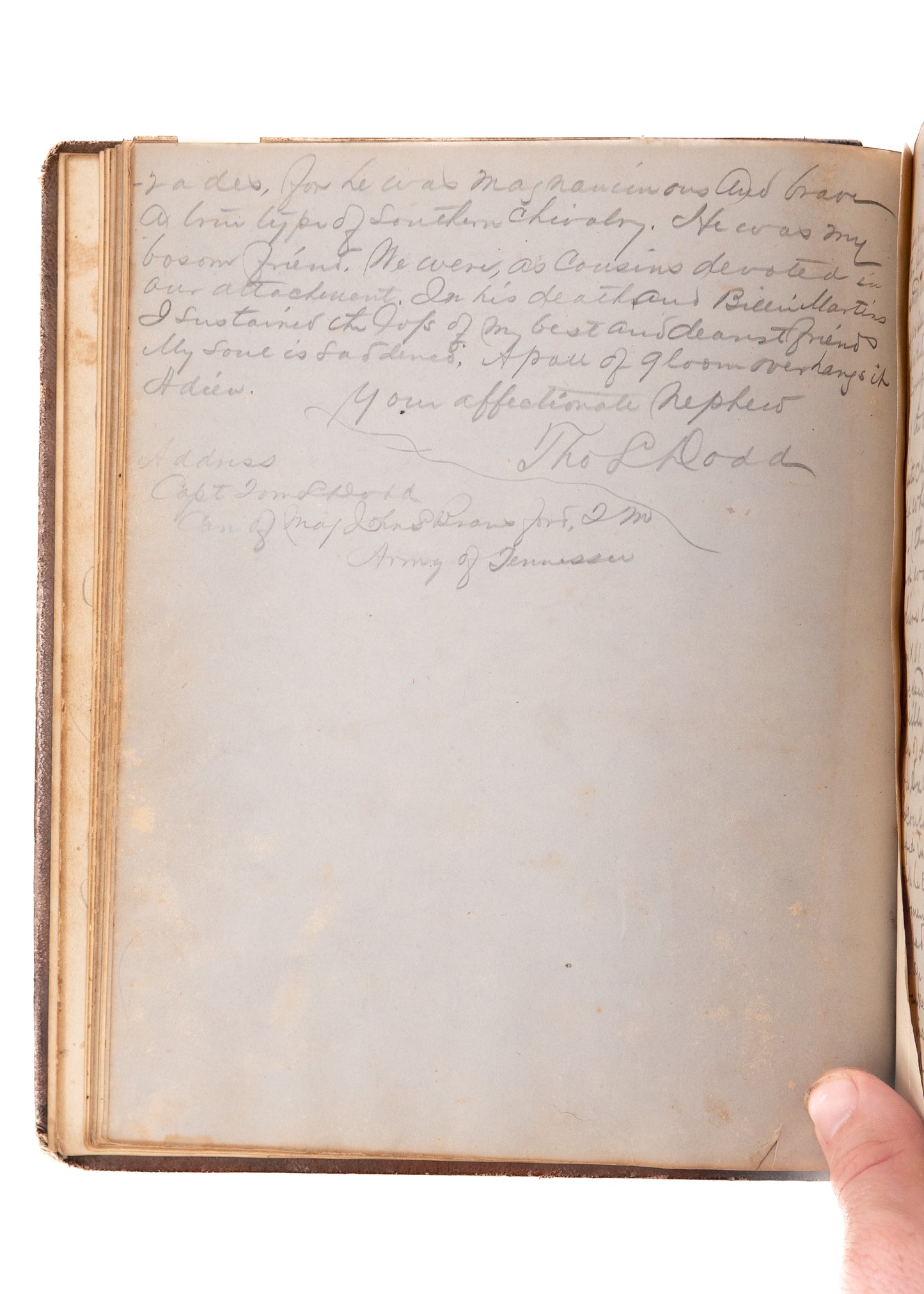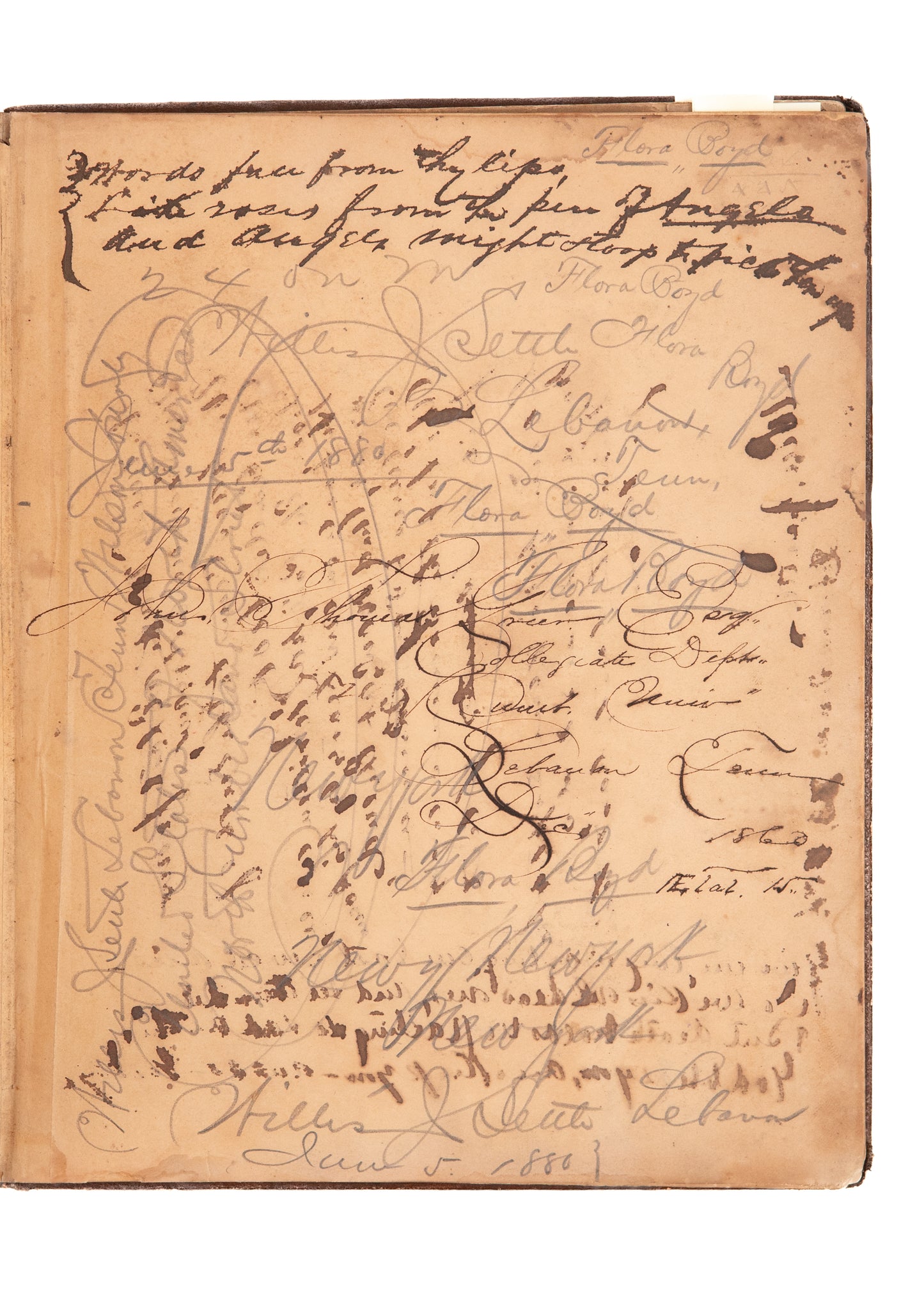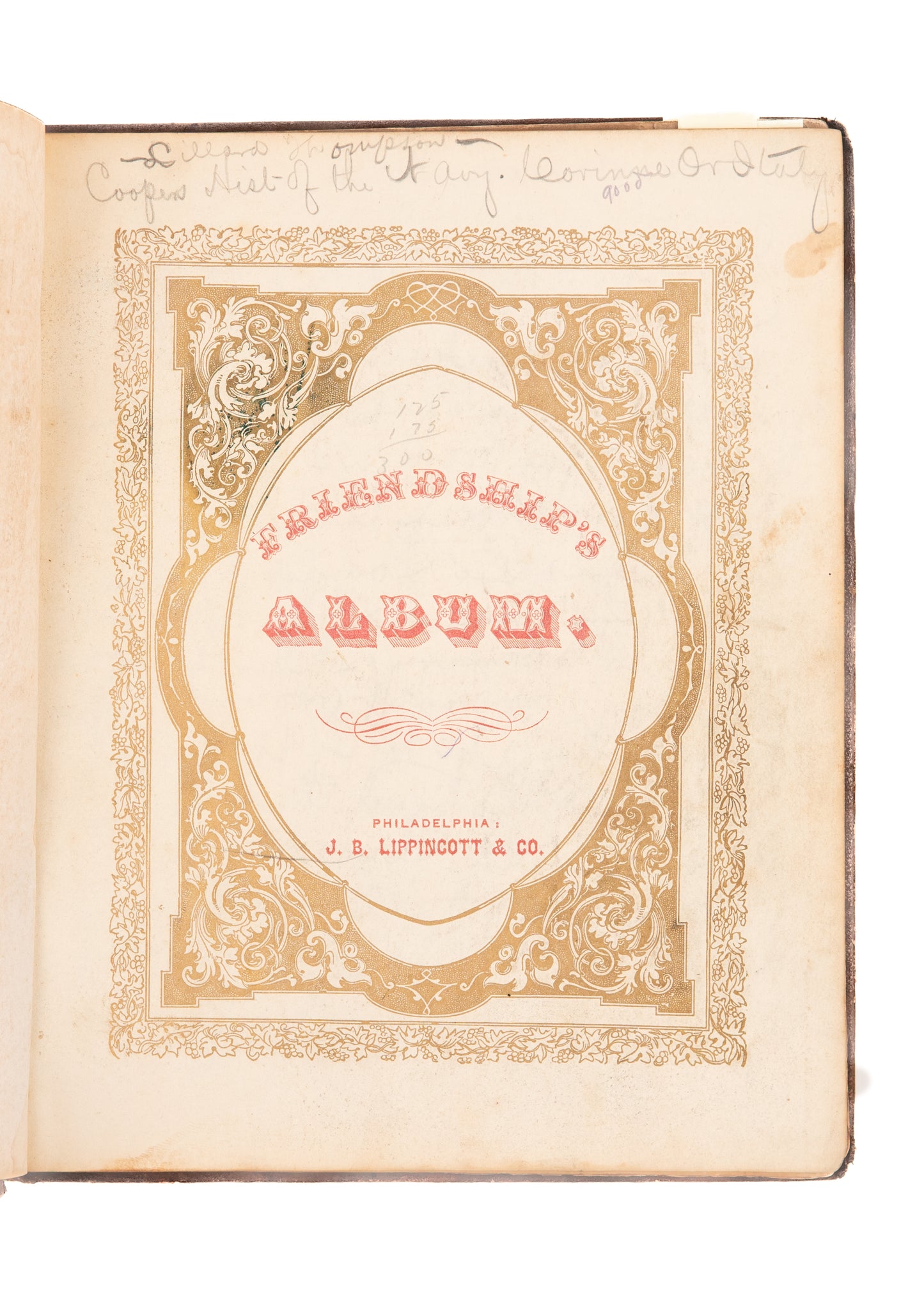Specs Fine Books
1863 TENNESSEE CONFEDERATE SOLDIER. Journal of A. G. Settle - Killed in Action in Georgia, 1863.
1863 TENNESSEE CONFEDERATE SOLDIER. Journal of A. G. Settle - Killed in Action in Georgia, 1863.
Couldn't load pickup availability
A very fine family album, with inscriptions from many family members, belonging to the Settle family of Lebanon, Tennesee, and later Nashville.
The initial / primary owner seems to have been LeRoy B. Settle [b.1793]. He married Margery Greer. Almost certainly his album first, then taken up by his children.
The preliminary sheets bear signatures of multiple Settle family members:
Pastedown: Sarah E. Brewer. Hotal Cubano, Havana; J. Thomas Greer. Collegiate Department, Cumberland University. Lebanon, Tennessee. December, 1860. Aetat 15; Willis Settle Esq. Lebanon, Tennessee. Wilson County; Lucy Pickett, Nashville, Tennessee; W. J. Settle.
Ffep: Flora Boyd; William J. Settle. John Thomas Greer Esq. Collegiate Dept. Cumb. Univ. Lebanon, Tenn.; etc.,
Many of the leaves are occupied with original and extracted love notes and poems from Willis Settle, perhaps to Flora Boyd, including some rather charming examples which appear original. Plus many extracted from Longfellow, Jean Ingelow, A. P. Willis, etc.,
Important content includes:
*An original note regarding the literary works of Abolitionist George William Curtis, who had apparently recently spoken in the area . . “his talk was small, hugely fond of slang, contempt of religion and its ministers &c.”
*A four-page Confederate States of America soldier obituary, signed LeRoy B. Settle. It was published verbatim in The Daily Dispatch. It is signed in the dispatch as by “A Friend,” but signed in the album by Settle and it was almost certainly penned by him. Settle pens other prose and poems in the album in a similar strain, the soldier who died was from the area Settle lived, and it is clearly penned by a local friend rather than a reporter or fellow soldier. This then is likely Settle’s original or a holograph of the obituary he penned and here preserved in his album. It is as follows:
[Inscribed to the memory of R. N. Jackson Company. "H," 7th Tennessee Regiment who fell mortally wounded on the plain of Manassas on the 30th ult]
Many have fallen in our struggle with the minions of tyranny, and many more will be sacrificed ere the destined goal of independence is attained Every day some cherished gem is taken from the jeweled chain of friendship — the notes of some melodious lyre, to which we were wont to hasten are hushed. Since this cruel war was inaugurated all of us have mourned the loss of dear friends whose valor will shed an undying halo on the page of our young history. Our sensibilities have become so hardened by the frequent repetition of sorrow that we contemplate with composure the dread visitations of death. Yet the departure of a gallant spirit occasionally opens up the latent feelings of the heart, and cause them to gush in deepest sorrow.
Such was the case when the writer was informed of the fate of him whose virtues he would fain portray. 'Tis hard to realize that one so radiant of life, animated with all the buoyant hopes of youth, has been taken from the scenes of earth. Yet its so. The playmate of my childhood, the friend of maturer years, is gone. No more will I feel the warm pressure of his hand, or gaze into his eyes, beaming with all the kindliest emotions of friendship. 'Tis painful to contemplate death at all times; but doubly so when it seizes the proud form of early manhood, lingering, as it were, in the lap of youth. But when we consider the circumstances that attended his exit our pain is rendered less acute. He fell on the red battle held, where men contend for right, offering his young life a willing sacrifice on the altar of that country he loved so well. When the tocain of war sounded young Jackson was among the first to enrolled his name. Sundering the lies which bound him to home and loved ones, he eagerly went forth to do battle for his fatherland, and nobly, thrice nobly, did he perform his part in the thrilling drams that succeeded. He participated in every campaign in which his regiment was engaged, and was never absent when the stern realities of battle tested the true soldier. He passed unscathed through many a fiery ordeal, and his friends fondly hoped he would live to receive the reward of gallantry and the meed of praise so justly due. But. alas! while his sky was unclouded. and bright anticipations clustered about his path, the "insatiate archer" claimed him as his own. But why mourn him now, or seek to enumerate his many virtues. He has gone where detraction can never harm, nor will flattery soothe the dull, cold ear. Although no sister's hand soothed his dying pillow, nor mother imprinted a last kiss on his pallid cheek, yet the want of woman's nursing was replaced by the warmth of devoted friendship which characterized his hardy comrades.
We cannot hope to comfort his afflicted parents, who mourn in a distant land. We pause in awe, last we invade the holy sanctuary of domestic grief. There is an anguish too deep for consolation. Let us trust that Him, the Great Restorer, will heal the lacerated hearts, and hope, with its sweet whispering tale, will tell of a happy reunion.
Away in the distant South,
The home of his youth.
A fond mother is sadly weeping
For her noble boy.
Her pride and her joy.
Midst fees in a lonely grave sleeping.
In the cold gray dawn
Of the early morn
Her heart its lone vigil is keeping;
At noon and at eve
She ever doth grieve
For him in that lone grave sleeping.
*An original sequence of lines by A. G. Settle, being an unpublished set of thoughts on the Southern notion of “Honor.” Fascinating in the context of A. G. Settle’s then-current service in the Confederate Army.
I may err, but I have always
thought that Honour rules over
All the Hierarchy of duty
In our modern society.
It takes the place to day of so many virtues, half effaced
from the consciences of men, of so much half dead faith
that it would never enter into my mind to weaken its
authority, to discuss its decrees, to subordinate its obligations.
Honor in its undefined character, is something superior
to laws and morality.
It is a religion, if one have
No longer the faith of the cross – Let us preserve the
faith of Honor. We are now under Gen. Kelley and
and picketing in front of Dalton Georgia –
Wounded by a fragment of a shell (extract from AGS Diary)
*An original poem by A. Greer Settle
Oh! Sweet is the current magnetic that flows
From spirits congenial, which now feel like those
Who, floating or tossed along fates fickle tide
Are brot in sewet contact & float side by side
‘Tis felt in the air when a lov’d one is nigh
‘Tis felt in a flash of the soul from the eye
It steals through the arms when a lov’d hand we press
And thrills through the soul form a lov’d one’s carress.
*A verbatim copy of the letter notifying the family of the death of Archibald Greer Settle during the Civil War. Apparently unpublished elsewhere.
Fort Valley, Georgia. October 31, 1864. Mrs. Margery W. Settle.
Lebanon, Tenn.
Beloved Aunt: Although I have often thought of you, and of the hours of pleasure I passed at your delightful home, I have never written.
Now dear Aunt, the duty devolves on me to write. It is one of pain. How gladly would I dash the cup aside which I am about to present to your lips. It is not in my power, would to God it were.
Before you read farther, look to God, Aunt, whom doth all things for the best, & beseech him to nerve your heart for the sad trial, which it is to undergo. This life is one of sacrifice and pain. Happiness has long since flown the abode of man.
The ways of God are inscrutable. Whom He loveth He chasteneth. Bow your heart to the ***** of Providence. Let me hurry onward with my task. Your gallant and high-souled son, Arch Greer, was in the Battle of Dalton Geo, on the 20th August. He was at the post of honor. He bravely met the foe. His comrade Lt. Morgan, of Gen. Dibsell’s Staff, states he acted nobly. He fell, pierced by a ball in the vicinity of the heart. He is dead! He died a martyr to the Southern Cause. He was beloved by his Comrades, for he was magnanimous and brave. A true type of Southern chivalry. He was my bosom friend. We were, as cousins, devoted in our attachment. In his death, and Billie Martin’s, I sustained the loss of my best and dearest friends. My soul is saddened. A pale of gloom overhangs it.
Adieu.
Your affection Nephew
Thom L. Dodd
Address
Captain Tom L. Dodd
Care of Maj John S Bransford. Army of Tennesee
*A full-page eulogy written on the death of LeRoy B. Settle:
One of our very best citizens has gone to his reward, Maj. Leroy B. Settle. He carried with him through life those notions of rectitude peculiar to one born and raised in “Old Virginia.” In his youth he removed to Kentucky – thence to Tennessee; in which he has lived for forty years. More than twenty years of this time he spent in the mercantile business. He arrived at that position that men generally are anxious to attain – he was successful. The sun of prosperity shone upon him. The gales of affluence filled the canvass of his vessel.
About twenty-four years ago, he married an elegant lady of Lebanon, Tenn., Miss Margery W. Greer. They lived together in family love and order until his departure to a better world. They baptized six children, one of whom has gone to Virignia, in this service of this Country, and two have gone to Heaven. Bro. Settle was brought into church fellowship many years ago, through the instrumentality of Dr. Green. The writer knew him well, and loved him dearly. He was sincere. You could believe what he said. He died July 9, 1861, and was followed to the grave by the longest procession I have seen for many years.
*A Poem by A. G. Settle [with corrections]
Lines on the Death of My Sister.
Her little life is o’er
And very bitter are the tears we weep
That death’s cold hand has sealed forevermore
Her blue ***** eyelids in sleep.
She lies a lovely bud
Untimely blasted by the tempest’s power
Yet she will bloom beyond life’s troubled flood
A bright and glorious flower.
Alas! That she should die
Yet we can still behold her spirit’s form
As bright star through the cloud rifts of the sky
As rainbow in the storm.
*An obituary for slain Confederate soldier, Archibald Greer Settle by Thomas L. Dodd. Not traced in publication.
Adjutant Arch Greer Settle of Forrest’s Cavalry C.S.A. fella t the battle of Dalton, August 15th, 1864, in the 24th year of his life.
His remains have just been disinterred from the battle-ground and removed by his grief-stricken mother to the family cemetery at Lebanon, Tennessee.
He graduated in the Law and Literary Departments of Cumberland University with high honor to himself and credit to the institution.
To know him was to love him.
A heroic, high-souled, generous-hearted type of true Tennessee chivalry and nobility, he fell at the post of honor on the gory field of fame.
Farewell cherished spirit, though dead thou art buried in the affections of thy people and shrouded in the mouths of thy country’s imperishable glory.
His blade leaps not at the long loud cry
Nor starts and streams with the crimson dye
He shouts no charge nor the brave line leads
For he lies in the grave of his glorious deeds.
Etc., etc., etc.,
Share
